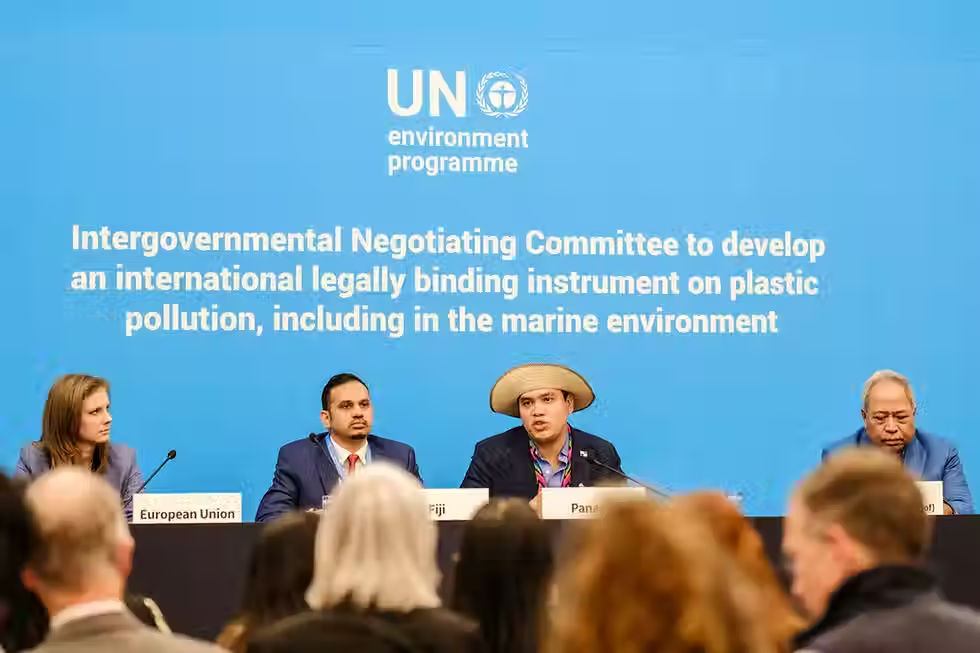Ambition Lost in the Night at INC5.2
- Pacific Islands Climate Action Network

- Aug 15, 2025
- 3 min read
Updated: Aug 21, 2025

IMMEDIATE RELEASE
GENEVA, 15 August 2025 — The fifth resumed session of the Intergovernmental Negotiating Committee on a Global Plastics Treaty ended without a strong, ambitious and binding text that meets the scope of UNEA resolution 5/14. Negotiators waited until 2am for a second draft text, only to rush a closing plenary at 5:30am the same morning. This last minute scramble exposed a broken process and a worrying lack of political will while our islands continue to drown in plastic.
Plastic pollution continues to poison our food, damage fisheries, harms health and destroys the coastal places that sustain culture and livelihoods. Each delay in delivering an ambitious and legally binding instrument that addresses the full lifecycle of plastic imposes real costs on Pacific communities. We cannot accept half measures, weak language, or compromises that reduce the treaty to waste management alone.
The scale of corporate influence at INC5.2 was startling. At least 234 lobbyists from fossil fuel and chemical industries registered for INC5.2. They outnumbered scientists and Indigenous delegates by large margins. This heavy industry presence at the final drafting stage raises urgent questions about who is shaping rules meant to protect communities and ecosystems.
Pacific Small Island Developing States (PSIDS) displayed principled leadership. PSIDS demanded a treaty that covers the whole lifecycle of plastics, limits production, removes toxic additives, enshrines polluter pays, prioritises reuse and refill systems, and secures binding finance for frontline countries. Their positions were rooted in lived reality and science. Their clarity stood in stark contrast to the compromises on the negotiating floor.
Negotiators will resume talks at a date yet to be specified and this cannot be business as usual. We call on governments to reconvene with urgency and integrity, to reject watered down text that leaves industry loopholes, to fix the rules of procedure so progress cannot be blocked by a minority, and to consider the adoption of voting options that prevent the tyranny of consensus.
The Pacific will not be silent. We will continue to champion a treaty that ends plastic colonialism, secures finance for frontline communities and makes polluters pay for the harm they have caused.
Reactions from PICAN:
Rufino Varea, Director of the Pacific Islands Climate Action Network (PICAN) says:
“This outcome is a betrayal of communities that already shoulder the burden of plastic pollution. Our fisheries, our food and our health are being sacrificed for corporate convenience. Industry lobbyists should not be allowed to write the rules for our waters and our shores. We will not accept a treaty that locks us into a future of pollution and debt. If this broken process will not deliver a strong treaty, then progressive countries must consider a treaty of the willing with voting options that stop the paralysis. We will not stop fighting until the treaty protects people and stops plastic production at source.”
Dr Sindra Sharma, International Policy Lead at PICAN, said:
“We can be extremely proud of our Pacific negotiators. They worked tirelessly to hold the line, showing flexibility but never compromising on our core principles. From one multilateral environmental agreement to the next, it is always the Pacific that is asked to give ground. We are caught between a rock and a hard place: developed countries refusing to lead or provide the necessary finance, while emerging economies and a handful of developing states protect their industries and, alarmingly, deny the science—at the expense of their own people. The Pacific rejected this. We stood firm, powerfully, and refused to accept an outcome that would undermine the needs and rights of our current and future generations.”
##
About PICAN
PICAN is a regional alliance of 190+ non-government organisations, civil society organisations, social movements and not-for-profit organisations from the Pacific Islands region working on various aspects of climate change, disaster risk and response, and sustainable development.
Media Contact:
Dylan Kava, Strategic Engagement and Communications Lead, PICAN
dylan.kava@pican.org | +679 9061989 (Manila / GMT+8)




Comments